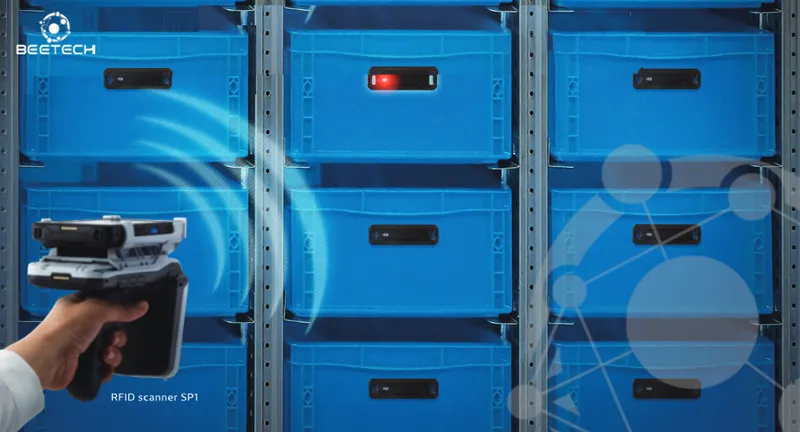80-82 Cao Duc Lan, District 2, HCMC, Vietnam
+84 76 865 6688
info@beetech.com.vn
+84 76 865 6688
About us
Contact us
80-82 Cao Duc Lan, District 2, HCMC, Vietnam
+84 76 865 6688
info@beetech.com.vn
+84 76 865 6688
About us
Contact us

Modernizing warehouses with RFID tags: The inevitable trend of Logistics 4.0
In the context of global digital transformation and the rapid development of e-commerce, the need to optimize supply chains has become more urgent than ever. Modern enterprises no longer compete solely on products but also on speed and operational accuracy. This leads to a growing trend of warehouse modernization—considered the “heart” of logistics operations.
A modern warehouse is not just a storage location, but also a center for data processing, inventory control, and goods flow optimization. Here, technology plays a core role, with radio frequency identification (RFID) tags standing out. With their ability to identify items quickly, accurately, and automatically, RFID tags have become an essential solution in a company’s digital transformation journey.

RFID (Radio Frequency Identification) is a technology that uses radio waves to transfer data between a tag attached to an item and a reader device. This technology allows for automatic data collection without direct contact or manual scanning like traditional barcodes.
A basic RFID system includes:
Common types of RFID tags:
RFID operates across three main frequency ranges: LF (125–134 kHz), HF (13.56 MHz), and UHF (860–960 MHz). UHF is the most widely used in warehouse management due to its longer range and higher speed.

RFID tags bring significant benefits to warehouse operations:
For example, a fashion retailer using RFID reduced inventory time by 30% and improved accuracy to 98%.
| Criteria | RFID Tags | Barcodes |
|---|---|---|
| Scanning Range | 1–10 meters | Less than 0.5 meters |
| Read Speed | Bulk scanning (1000 items/sec) | One at a time |
| Automation | Very high | Manual |
| Reusability | Yes | Limited |
| Durability | High (resistant to water, shock) | Easily torn or faded |
| Data Storage | High capacity | Limited |
Although RFID tags have higher initial costs, their long-term efficiency has helped them gradually replace barcodes in many sectors.
Many global corporations have adopted RFID to improve warehouse processes:
In Vietnam, distributors and retailers such as Thế Giới Di Động, PNJ, and Vinmart are also piloting RFID for inventory and retail management.
RFID costs include:
According to Zebra Technologies:
RFID is most cost-effective for high-value items, frequently moved goods, or environments requiring strict control.
Challenges:
Solutions:
RFID tags are not only revolutionizing warehouses but also forming the backbone of future smart logistics ecosystems:
Gartner predicts that by 2027, over 80% of logistics companies will use RFID or equivalent technologies for asset management.
RFID tags are no longer just a support tool—they are becoming a core component in the digital transformation of warehouses and logistics. From processing speed to error reduction and integration potential, RFID represents a breakthrough in warehouse optimization and customer experience enhancement.
Vietnamese enterprises should proactively explore, pilot, and implement RFID to stay competitive in the global digital race.
Beetech is a trusted provider of end-to-end RFID solutions in Vietnam—from system consulting and device supply to implementation and software integration. With hands-on experience and a team of RFID specialists, Beetech helps businesses optimize warehouse operations, enhance efficiency, and reduce operating costs.
Contact Beetech today for a free consultation and discover the RFID solution that best fits your business needs!
🌐 Website: www.beetech.com.vn
📧 Email: info@beetech.com.vn




RFID and Digital ID – Revolutionizing the Food Industry Supply Chain
13/05/2025 09:23:01

Why should RFID tags be used in garment industry management?
13/05/2025 07:29:06

What is an RFID Wristband? Top 5 Reasons to Use an RFID Wristband
09/05/2025 07:05:15

What Is an RFID Gate System and How Does It Work?
09/05/2025 03:51:53

The Role of RFID in Healthcare
09/05/2025 02:55:55

What is RFID and why does it help manage inventory more accurately and efficiently?
06/05/2025 03:09:45